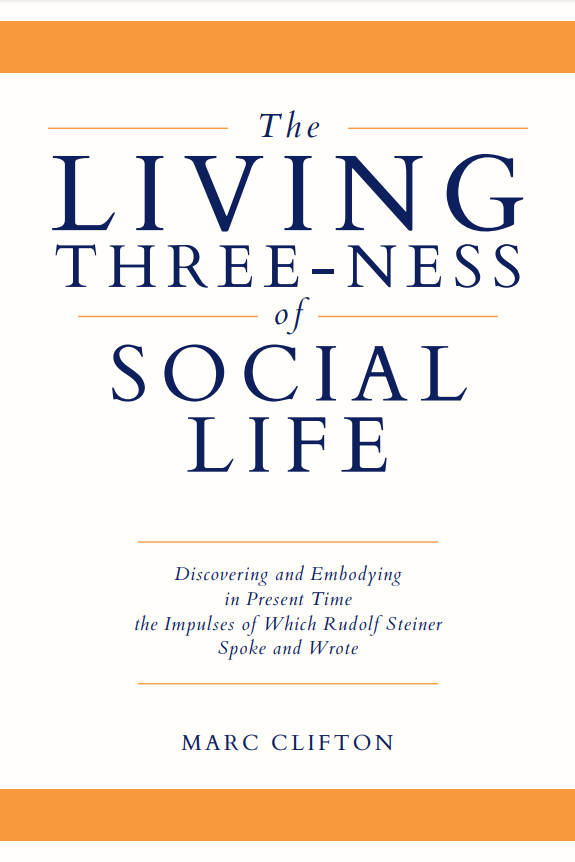Website Updates
New articles have been posted in the Articles section:
Synopsis: Counter-Value: A Necessary Change from Wage
Full Essay: Counter-Value: A Necessary Change from Wage
From the Introduction by Marc Clifton
The purpose of this book is to revisit Steiner’s book, GA 23, Basic Issues of the Social Question (Die Kernpunkte der sozialen Frage), in the context of the 21st century and in relation to the political, economic, and cultural changes that have occurred in America over the last century. Since Steiner’s publication of GA 23 in 1919, we have seen significant changes in agriculture, science, medicine, education, social reform, warfare, and media (to name some of the major ones.) The Nineteenth Amendment, passed by Congress in 1919 and ratified in 1920, finally gave women in the US the right to vote. The transistor, key to all modern computer technologies, was invented in 1947. Important civil rights legislation prohibiting discrimination, protecting people with disabilities and protecting the rights of minorities, was passed in the 1960’s. Banking regulations such as the 1980 Monetary Control Act have affected banking and commerce, theoretically for the better. The Internet was ‘born’ on Jan 1, 1983. Generative AI (the ability for ‘Artificial Intelligence’ algorithms to create new content, such as artwork, music, and text) has been making a significant impact in our society since early 2023.
While legislation and social, economic, and technological advances have been significant, they have, if anything, created an environment that is even more inflexible and resistant to change now than in 1919, when one considers international interdependencies in production, distribution and consumption and how technological advancements in communication bring heightened and immediate information of cultural disparities, particularly concerning human dignity. Furthermore, we see many inappropriate influences of one domain on another domain – for example, special interest groups in the domain of economics lobbying to influence legislation in the domain of rights.
Embodying the significant changes outlined in GA 23 will ultimately entail global change and that global change can only occur if people willingly call for these changes, or if lacking that they are pressed to demand them under the duress of a true global crisis. However – barring global catastrophe – in today’s world, attempting to make deep system-wide changes all at once is the wrong approach. Steiner pointed out:
One need not do away with state schools and state economic institutions overnight; but from out of perhaps small beginnings one will see the possibility grow up that a gradual dismantling of the state education and economics will take place. Above all, however, it would be necessary that those individuals who are able to permeate themselves with conviction concerning the correctness of the social ideas presented here, or of similar ones, attend to their dissemination.
— GA 23, a bit over ½ into Ch. 3 (p. 108); KRH translation
It is my view that even changes “from out of … small beginnings” are unlikely to happen unless we begin attending to the practice of the dynamics of the three-membered organization, approaching it in a balanced way, individually and in small local group activity, which will be elaborated on in the section “Individual and Group Realization of the Three-Membered Organization.” Steiner wrote (this quote is slightly out of context):
... people say constantly, ‘to realize the threefold order, human beings must be different than they are now.’ No!
— GA 24, “Ability to Work, Will To Work, and the Threefold Social Order” last page (p. 83)
While governments and corporations will not pursue changes of this magnitude on the political-rights, economic, and spiritual-cultural domains, it is absolutely possible to work locally with the three-membered organization right now. In an article on Sept 9, 2022 posted by The Guardian regarding Kohei Saito’s book Capital in the Anthropocene, Saito points out how the COVID pandemic has demonstrated that rapid change is actually possible, particularly in the context of the environment:
The response to Covid-19 had shown that rapid change is not only desirable, but possible, he [Saito] says.
“One thing that we have learned during the pandemic is that we can dramatically change our way of life overnight – look at the way we started working from home, bought fewer things, flew and ate out less. We proved that working less was friendlier to the environment and gave people a better life. But now capitalism is trying to bring us back to a ‘’normal’’ way of life.”
— https://www.theguardian.com/world/2022/sep/09/a-new-way-of-life-the-marxist-post-capitalist-green-manifesto-captivating-japan
Caution, however, is advised. Ironically, the social, economic and technological advances have enabled a ‘giving of voice’ to anyone with Internet access: podcasts, blogs, Twitter, YouTube videos – these and more are the modern salon for inundating each other with ‘opinion overload,’ much of which criticizes the very technologies and infrastructure that enable the individual to even have a voice beyond their local community. As often as we complain that the mainstream media lies to us, on the other hand we can be easily overwhelmed with the task of determining the truth (or not) of each other’s opinion on a particular topic. Especially with social media, “Confirmation bias occurs, when users encounter information that reinforces their pre-existing beliefs and attitudes.” To mitigate this, we must consciously engage in thoughtful discernment, both with regard to our own viewpoints and discerning the viewpoints of others as we explore the three domains of our social life.
